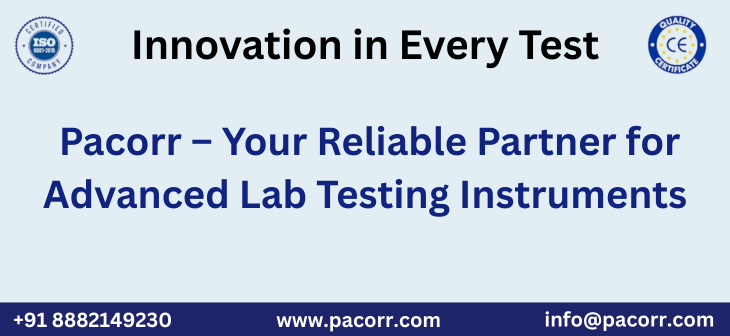
Pacorr has established itself as a premier manufacturer of high-precision material testing equipment, offering robust and reliable solutions to industries that demand accurate evaluation of mechanical properties. One of the most critical aspects of quality control and material characterization involves the measurement of elongation and yield strength, two fundamental parameters that define the performance of materials under tensile stress. Pacorr’s tensile testing machines are engineered to deliver precise data in compliance with international standards, making them indispensable in industries such as automotive, aerospace, construction, and manufacturing.
Understanding Elongation and Yield Strength in Material Testing
Before diving into the testing process, it is essential to understand what elongation and yield strength represent in the context of material performance.
Elongation refers to the extent to which a material can stretch or lengthen before breaking when subjected to a tensile force. It is usually expressed as a percentage of the original gauge length and indicates the ductility of the material.
Yield strength, on the other hand, marks the point at which a material transitions from elastic deformation to plastic deformation. At this stage, the material will no longer return to its original shape once the stress is removed. Yield strength is a critical property for determining a material’s ability to withstand mechanical stress without permanent deformation.
Role of Tensile Testing Machines in Accurate Measurement
Pacorr’s tensile testing machines are designed to measure both elongation and yield strength with exceptional accuracy. These machines apply a controlled pulling force to a standardized test specimen and continuously record the applied force and the corresponding deformation. The result is a stress-strain curve that reveals the full mechanical profile of the tested material.
With digital control systems, high-resolution load cells, and advanced extensometers, Pacorr equipment enables consistent and repeatable testing outcomes, crucial for industries that rely on material performance data for design, compliance, and quality assurance.
Step-by-Step Guide: How to Measure Elongation Using a Tensile Testing Machine
1. Sample Preparation
Testing begins with preparing a standardized specimen, typically shaped according to standards such as ASTM D638 or ISO 527. The gauge length, cross-sectional dimensions, and overall shape must meet the specifications to ensure accurate and comparable results.
Pacorr machines accommodate a range of sample geometries through adjustable grips and interchangeable fixtures, ensuring a secure and slip-free hold during testing.
2. Initial Gauge Length Measurement
Before applying any force, the initial gauge length of the specimen is recorded. This is the distance between two defined points on the sample, typically where the extensometer or other strain-measuring devices are attached.
3. Starting the Test
The tensile testing machine begins pulling the specimen at a constant speed. As the load increases, the material begins to elongate. The extensometer, which is either contact-based or optical, tracks this elongation in real time.
Pacorr’s systems capture elongation data with high precision, even for materials that exhibit minimal ductility or stretch at very low loads.
4. Recording Elongation at Break
The test continues until the specimen ultimately fractures. The total elongation is calculated by comparing the final length of the specimen to the original gauge length. The percentage elongation is then reported as a key metric of ductility.
Step-by-Step Guide: Measuring Yield Strength with a Tensile Testing Machine
1. Setting the Test Parameters
To accurately measure yield strength, it is essential to configure the testing machine according to the material type and standard test method. Factors such as crosshead speed, data sampling rate, and load cell capacity must be set correctly.
Pacorr’s testing systems provide intuitive control software where test parameters can be easily configured and saved for repeatable use.
2. Monitoring the Stress-Strain Curve
As the machine applies tensile load, it generates a real-time stress-strain curve. Initially, the curve rises linearly, indicating elastic deformation. The point at which the curve begins to deviate from this linear path is known as the yield point.
Some materials do not exhibit a distinct yield point. In such cases, the 0.2 percent offset method is used, where a line parallel to the elastic region is drawn starting at 0.2 percent strain. The intersection of this line with the stress-strain curve indicates the yield strength.
3. Recording Yield Strength
The machine software calculates and displays the yield strength based on the curve analysis. This value is critical for product design, especially in applications where the material must not deform permanently under service loads.
Pacorr’s machines offer automated detection of yield points, removing the subjectivity that can occur with manual interpretation.
Factors That Influence Elongation and Yield Strength Measurement
To ensure reliable data, several influencing factors must be controlled during testing:
- Specimen Alignment: Misalignment can introduce bending stresses, skewing the data
- Gripping Technique: Poor grip design can lead to slippage or premature failure
- Environmental Conditions: Temperature and humidity may affect test results for certain materials
- Machine Calibration: Pacorr recommends periodic calibration to maintain accuracy
- Data Sampling Rate: A higher sampling rate ensures critical transitions are captured accurately
Pacorr addresses these challenges by offering machines with ergonomic design, high-grade sensors, and customizable fixtures to accommodate a wide variety of testing conditions.
Applications of Elongation and Yield Strength Measurement
Measuring elongation and yield strength is vital across a wide range of industries:
- Automotive: Ensures metal components can withstand impact and load without deformation
- Construction: Validates that materials used in structural applications meet safety margins
- Aerospace: Assesses high-performance alloys for tensile behavior under extreme conditions
- Packaging: Determines the stretchability of films and laminates
- Medical Devices: Tests biocompatible polymers for their tensile properties
Each application depends on accurate and consistent testing results, which is why industries rely on Pacorr’s material testing machines to maintain their product standards and certifications.
Advantages of Using Pacorr for Tensile Property Evaluation
Pacorr’s testing solutions stand out due to their unmatched precision, robust construction, and adaptability across multiple sectors. Key advantages include:
- Advanced Digital Controls for easy operation and real-time monitoring
- High-Resolution Load Cells for accurate force measurement
- Extensometer Integration for precise strain and elongation capture
- Compliant with International Standards like ASTM, ISO, and BIS
- Customizable Fixtures and Grips for material-specific testing needs
These features combine to provide dependable performance in high-stakes environments such as R&D labs, production floors, and certification centers.
Conclusion
Accurate measurement of elongation and yield strength is essential for understanding how materials behave under mechanical stress. These properties not only influence product design but also play a critical role in safety, durability, and regulatory compliance. Pacorr’s tensile testing machines offer industry-leading precision and reliability, empowering engineers and quality professionals to obtain meaningful data that guides critical decisions.
With its dedication to engineering excellence and deep industry knowledge, Pacorr continues to lead the way in material testing equipment, supporting innovation, safety, and performance in every test.
Thanks to Pacorr Testing instruments, we have all the required quality testing instruments that have helped us to ensure the best quality delivered to our clients.

Danish
Fair Exports Pvt. Ltd.

